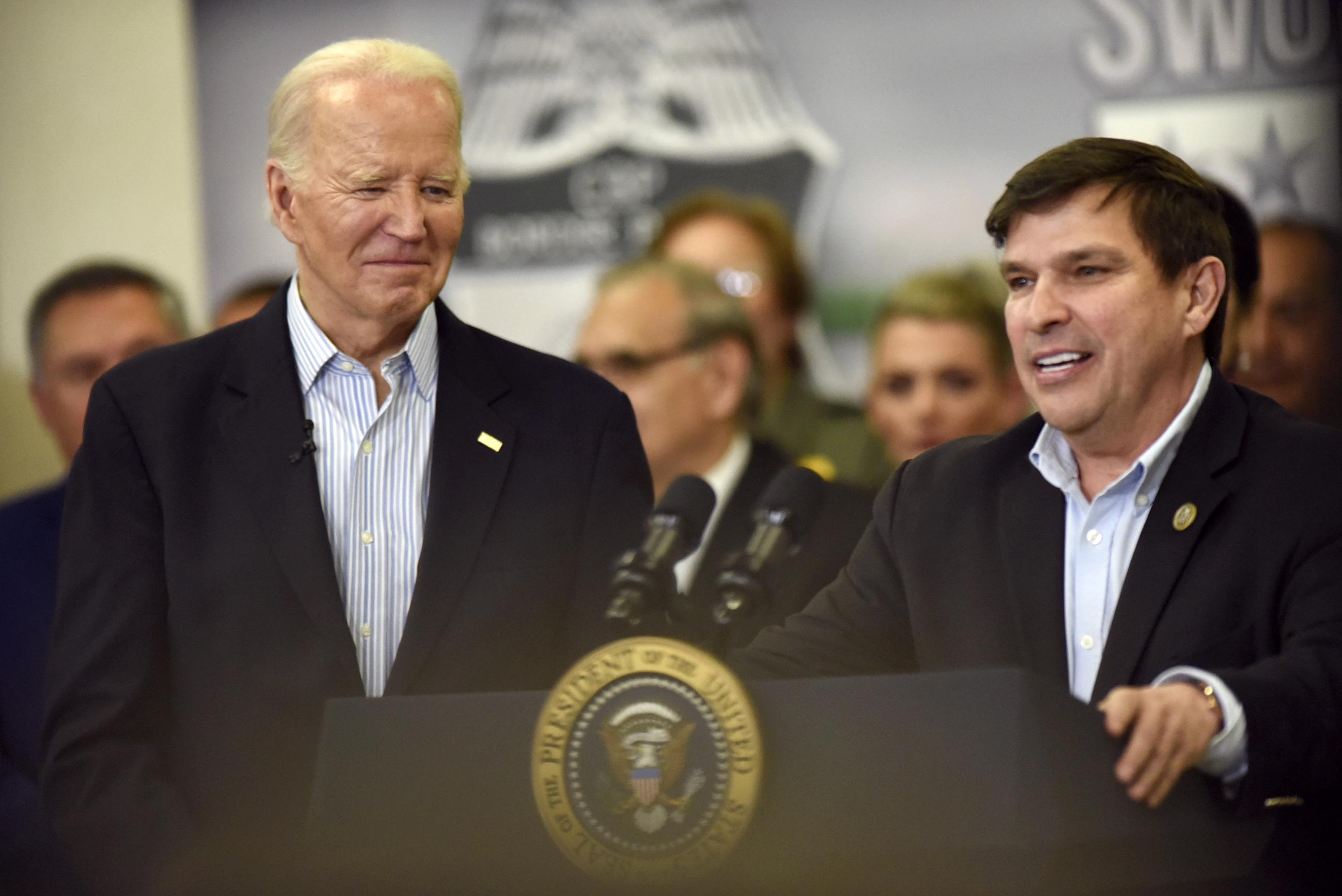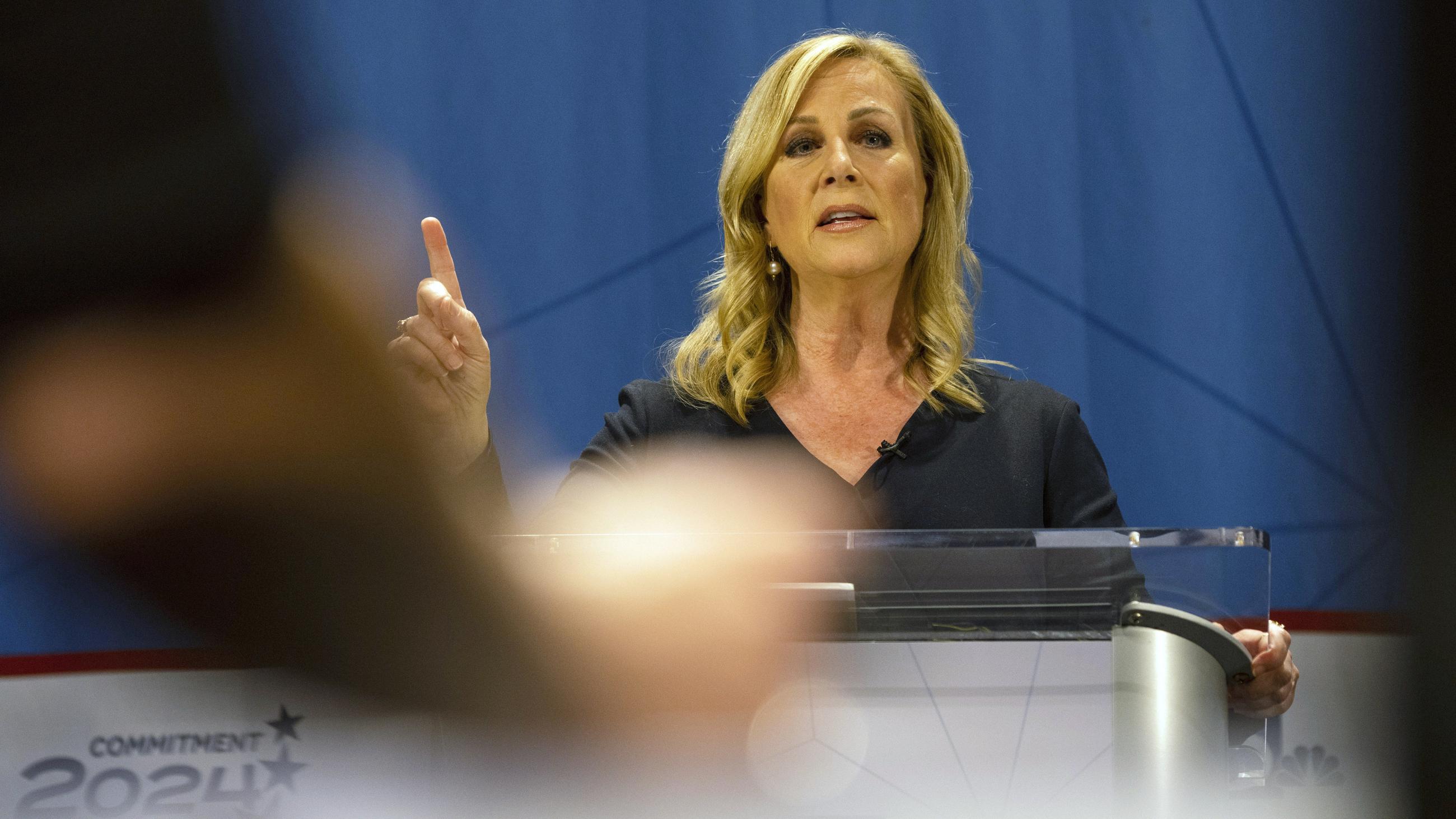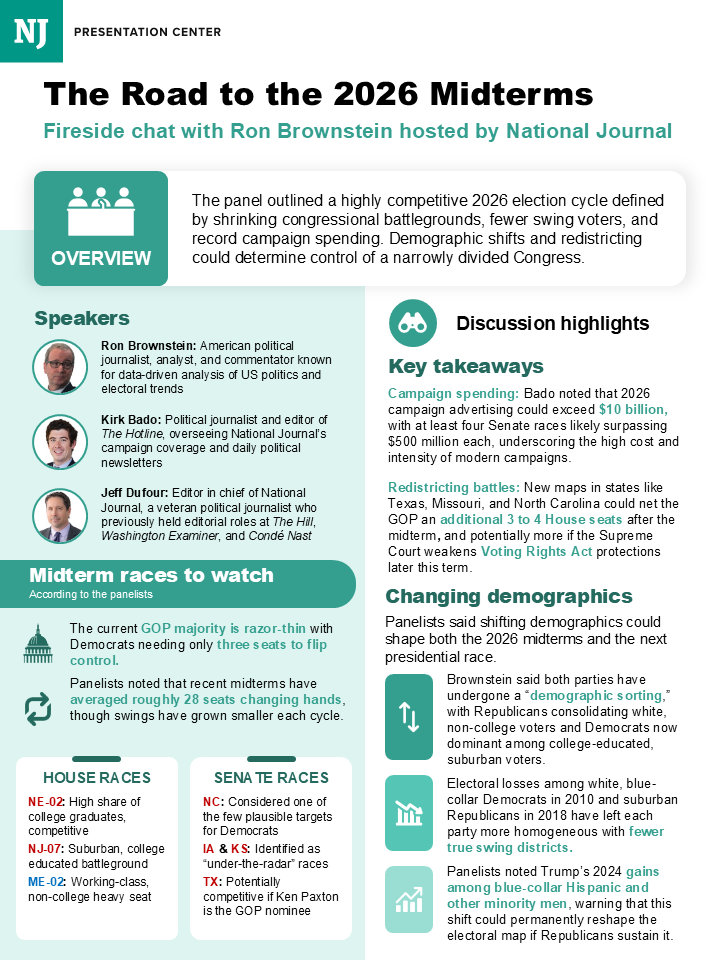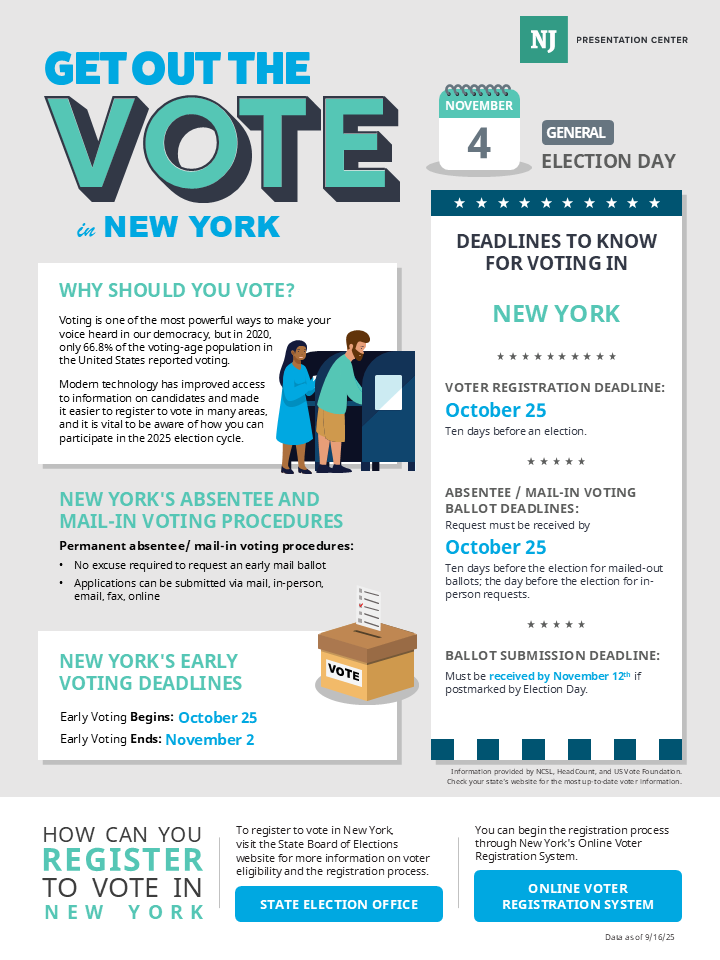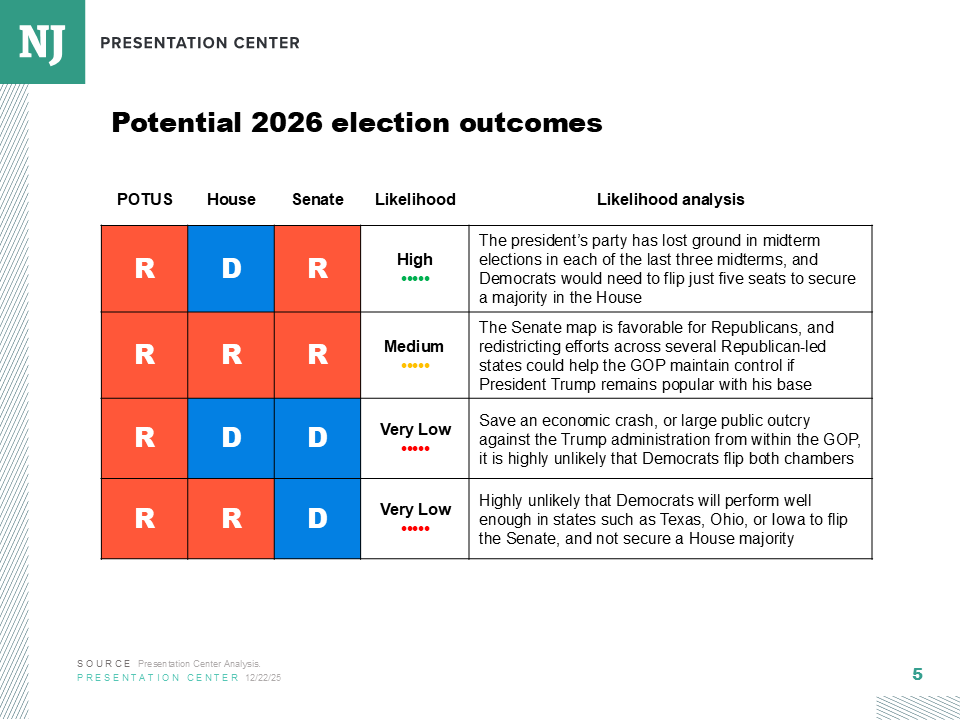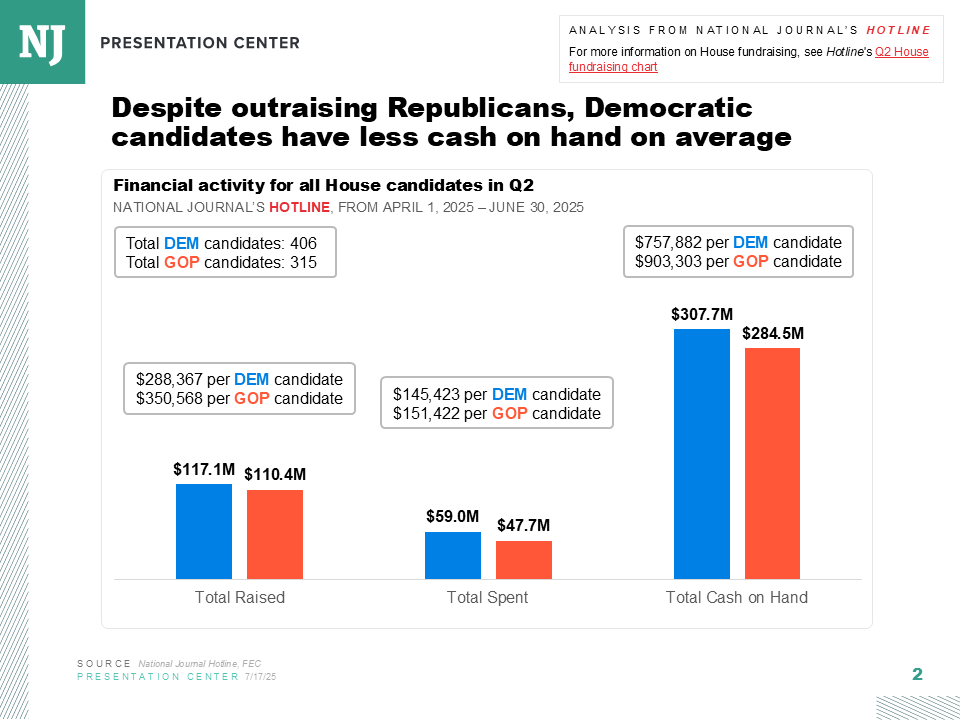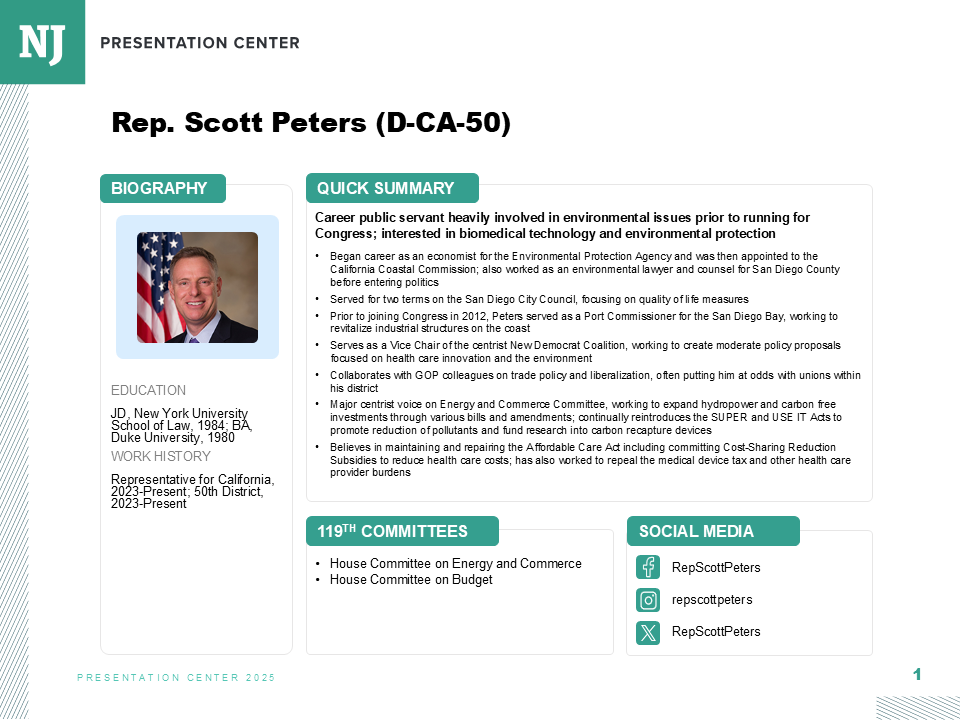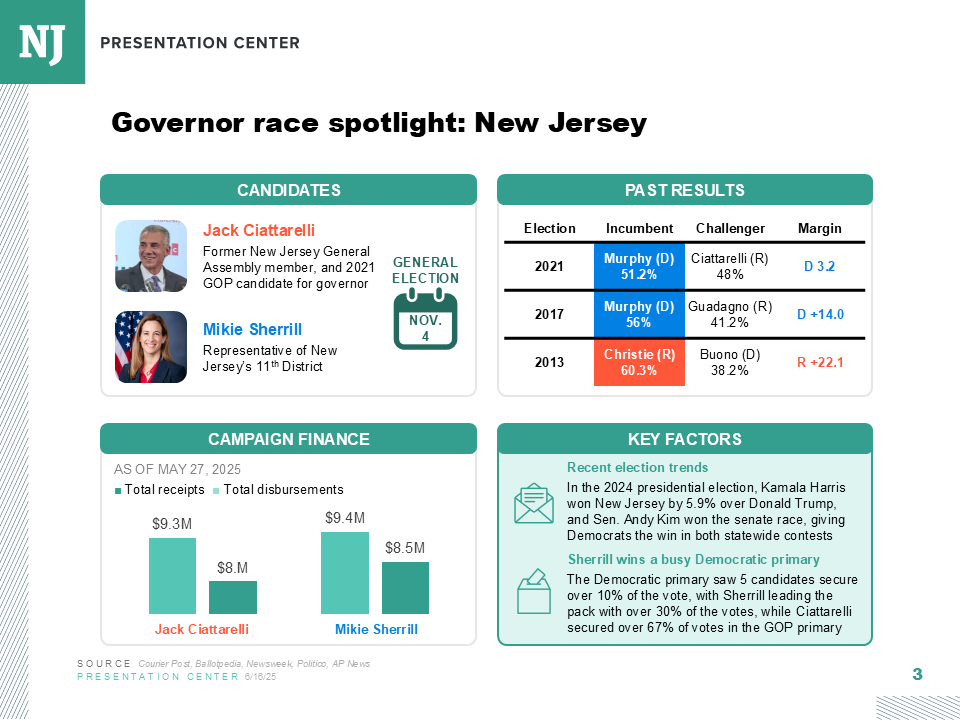At this stage in the cycle, there’s more uncertainty than certainty as the White House pushes Republicans to redraw maps and Democrats struggle to respond in kind.
At publication, only Texas and North Carolina have successfully passed new maps. California is currently counting ballots to respond to Texas. If passed, the state could add five new Democratic-leaning seats.
Hotline has opted to leave out a handful of seats that are all but guaranteed to flip and are deemed uncompetitive by campaign committees and super PACs. Two districts in Texas now skew heavily Republican and won’t be contested by either party, while a third went to President Trump by about 10 points and could come online as the primaries develop.
Seats in Utah, Missouri, and Indiana all face potential changes, but with judicial and legislative challenges still pending, the final district makeups are not currently clear. Republicans could benefit in up to three seats in Missouri and Indiana, while two GOP-held seats in Utah could become battlegrounds.
The list is based on conversations with strategists, consultants, and campaigns in both parties.
1. Nebraska’s 2nd: Open
This open seat remains atop the list, and it equally remains a must-win for Democrats in pursuit of the majority. The Omaha seat is just one of three Republican-held districts that former Vice President Kamala Harris won, due in large part to Rep. Don Bacon’s crossover appeal. With his retirement at the end of the term, Republicans have massive shoes to fill. Omaha City Councilman Brinker Harding and former state Sen. Brett Lindstrom are duking it out for the GOP nomination, while the Democratic field is crowded and largely unsettled. Regardless, whoever emerges on the Left will start with a leg up in the Democratic-leaning seat.
2. Texas’s 34th: Rep. Vicente Gonzalez (D) ↑
Redistricting did no favors for Gonzalez, whose district shifted 6 points to the right following the state’s contentious special session this summer. Gonzalez won reelection last year despite President Trump carrying the Rio Grande Valley seat, but demographics are often destiny, and it may be hard for the congressman to survive this time around. What could help him, however, is a contentious Republican primary between Eric Flores, an Army veteran and former federal prosecutor, and former Rep. Mayra Flores, whom Gonzalez has twice defeated.
3. North Carolina’s 1st: Rep. Don Davis (D) ↑
Davis is the other Democrat on this list who may fall victim to redistricting. Republicans in the General Assembly passed new lines, shifting the 1st District several points rightward—Trump would have won it by double digits—and effectively eliminating all swing districts in the Tar Heel State. Davis hasn’t made his decision known yet—he’s suggested he may run for reelection in the 1st or the 3rd against Republican Rep. Greg Murphy—but this instantly becomes a top opportunity for the GOP. There’s little Democrats can do to stop the map: Republicans have a supermajority in both chambers, and congressional maps are not subject to gubernatorial veto. Three local elected officials are duking it out on the Right for the opportunity to take on Davis, if he decides to stand and fight.
4. Colorado’s 8th: Rep. Gabe Evans (R) ↓
Evans hopes to become the first incumbent to win reelection in this district, which was newly drawn following the 2021 apportionment period. He defeated former Rep. Yadira Caraveo, who briefly launched a comeback bid, by a hair last year. With Caraveo out of the picture, state Reps. Manny Rutinel and Shannon Bird appear to be the front-runners for the Democratic nomination, but the field is crowded and still uncertain. Evans has leaned into crime and immigration in his early days in Congress, issues relevant in the Denver area, but he faces a tough reelection bid in what’s expected to be a bluer year than 2024.
5. Pennsylvania’s 7th: Rep. Ryan Mackenzie (R) ↓
The Democratic field is large, uncertain, and factional, as Mackenzie awaits the winner. Carol Obando-Derstine secured endorsements from EMILYs List and former Rep. Susan Wild, who lost to Mackenzie last year, but firefighter Bob Brooks appears to be a darling of signal-callers in Washington. Former federal prosecutor Ryan Crosswell has raised good money, but Republicans are salivating to prosecute carpetbagging allegations against him. Northampton County Executive Lamont McClure has elective experience, but he’s struggled to keep pace with fundraising. There’s no clear front-runner here, and it could get messy in one of the premier bellwethers across the country.

6. Maine’s 2nd: Rep. Jared Golden (D) ↑
Republicans have put Golden on their target list since he first was swept into office in the 2018 blue wave during Trump’s first term. Since then, he’s carved out a reputation as a committed Blue Dog Democrat, unafraid to buck party leadership, while going on to win again and again as his district gets redder. However, Golden might fall victim to Democratic infighting after State Auditor Matt Dunlap launched a primary challenge, claiming that Golden is insufficiently progressive.
Even if he survives the primary, Golden will face his toughest opponent yet in Republican Paul LePage. The former governor has a clear shot at the nomination and the resources to give whoever emerges from the Democratic primary a difficult race.
7. Ohio’s 9th: Rep. Marcy Kaptur (D) ↓
Kaptur, one of 13 Democrats representing a district Trump carried, overcame the partisan tilt of her northeastern Ohio district twice after GOP lawmakers redrew the map in their party’s favor following the 2020 apportionment. But the laws of political gravity might assert themselves on Kaptur this time, as another redraw of the Ohio map could pushES her Trump-won district into deeper MAGA territory. Even before the redraw, Kaptur faced a difficult race against likely GOP nominee Derek Merrin. The 2024 Republican nominee came within a point of beating Kaptur last year. He’s better resourced this time around, has the ability to self-fund, and has consolidated early support. Kaptur, 79, has vowed to run for reelection in the new district that tils slightly more in favor of Trump.
8. Iowa’s 1st: Rep. Mariannette Miller-Meeks (R) ↓
Miller-Meeks seems to have a knack for winning tight races. Last year she prevailed over Democrat Christina Bohannan by 800 votes out of nearly 413,000 cast, in one of the closest races in the country. That’s a landslide compared to 2020, when she beat Rita Hart by just 6 votes. Democrats say Miller-Meeks’s luck will finally run out next year. Bohannan is back and has the primary virtually clear. She outraised Miller-Meeks last quarter and entered October with more than $1.6 million in her campaign war chest. Miller-Meeks has struggled in past cycles to consolidate the support of her Republican base. A primary challenger, David Pautsch, received 44 percent of the vote last year with very little campaigning—a troubling sign for the incumbent. Republicans are quick to dismiss Bohannan as a perennial candidate (this is her third campaign in as many cycles), but Miller-Meeks unsuccessfully ran for Congress three times before finally winning in her fourth campaign.
9. Pennsylvania’s 10th: Rep. Scott Perry (R) ↓
Perry and Democrat Janelle Stelson are on a collision course for another high-profile matchup, after last year’s election saw Perry escape by just over a point. Stelson picked up where she left off in her first quarter of fundraising, stacking more than $1 million and outpacing the incumbent, who does not have a strong history of fundraising. Democratic Gov. Josh Shapiro won this seat by 13 points in 2022, and with the popular governor expected to cruise to reelection, Democrats think he might be able to help Stelson over the edge. That said, Perry has survived over the last few cycles even as the district trends Democratic. There’s likely to be fireworks in this one.
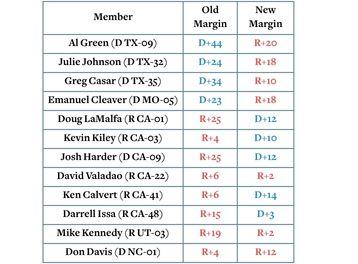
10. Arizona’s 6th: Rep. Juan Ciscomani (R) ↑
Ciscomani has fought through two close elections now, and that doesn’t appear likely to change in 2026. A newcomer, Marine Corps veteran JoAnna Mendoza, entered the Democratic primary and has raised solid money—she outraised Ciscomani in Q3—effectively clearing the field before it developed. Ciscomani was rumored to be considering a statewide bid this cycle, but he turned it down in favor of reelection—welcome news to Republicans after losing a handful of competitive incumbents to higher office. Ciscomani is an adept fundraiser and a skilled politician, but not having Kamala Harris—who tanked in Arizona in 2024—on the ballot won’t do him any favors as he seeks a third term.

